Time passes, unsuitable candidates come for interviews, and those that like, refuse offers. There is a feeling that you are wandering through an intricate maze, because it is not clear where the end of this path is, whether something can be fixed. But there is a set of actions that will help bring the moment when “that same candidate” will become part of your team.
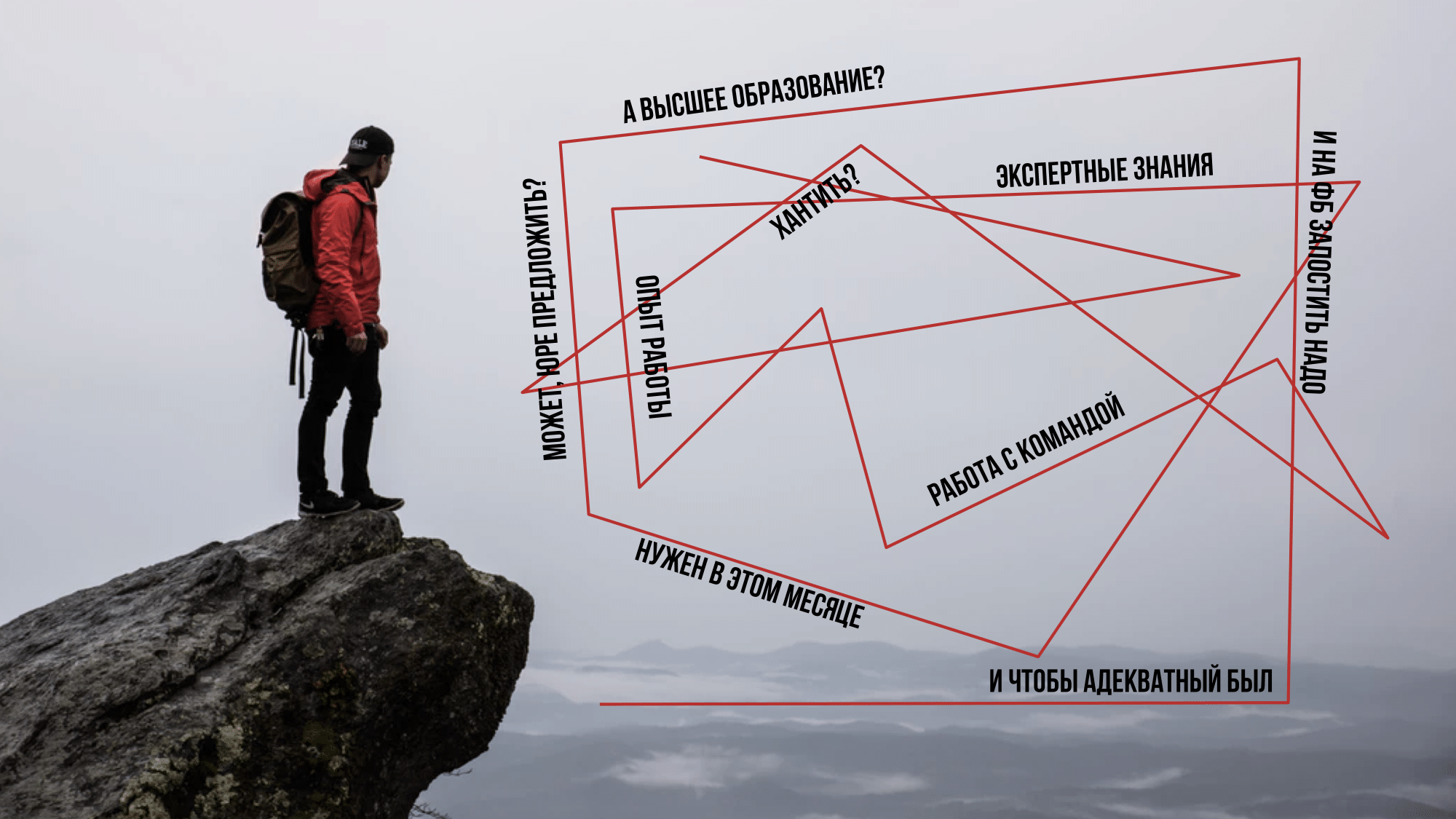
My name is Katya Gavrilova , I am the founder of the DigitalHR recruiting agency. Once I spoke at Saint TeamLead Conf in 2018, and my report “ The role of team leader in recruiting ” was in the top 5 best. And already at Moscow TeamLead Conf the report “A little experience - a lot of interviews: how to conduct an interview so that you don’t hide the truth from you” did not go to the top, but I still get good reviews from the developers on it, so I decided to share its version in text option. The target audience is team leaders and CTOs, who recently began to select employees for their team.
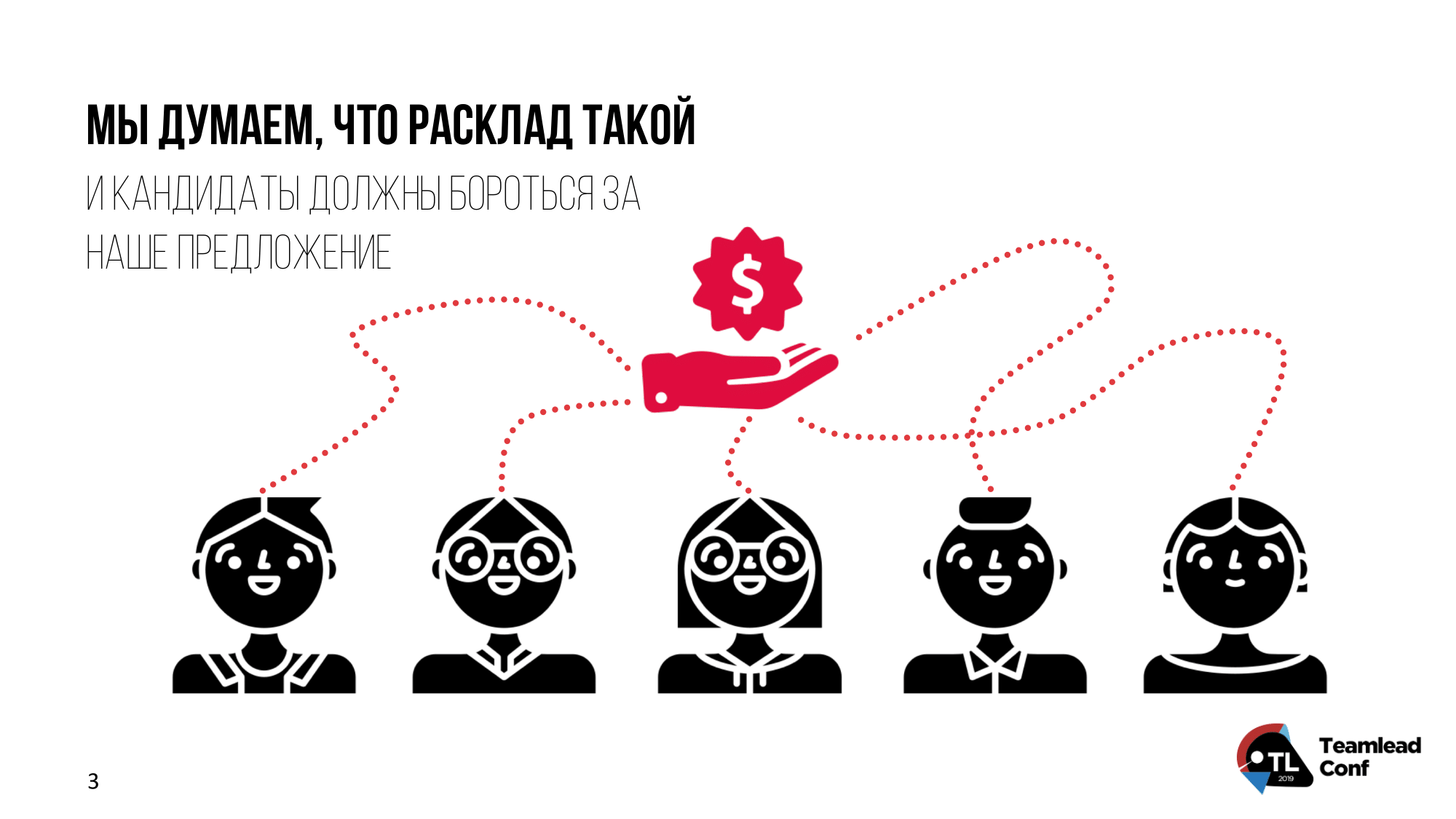
We imagine that the open vacancy in our team is unique, that the candidate must try to get it. Therefore, we give a test task before the interview, we come to the first interview with an impenetrable face ...
In this case, often the most hiring manager, someone several times a month, and someone several times a day, receive job offers: messages, letters, even calls. Thus, we compete for each candidate.
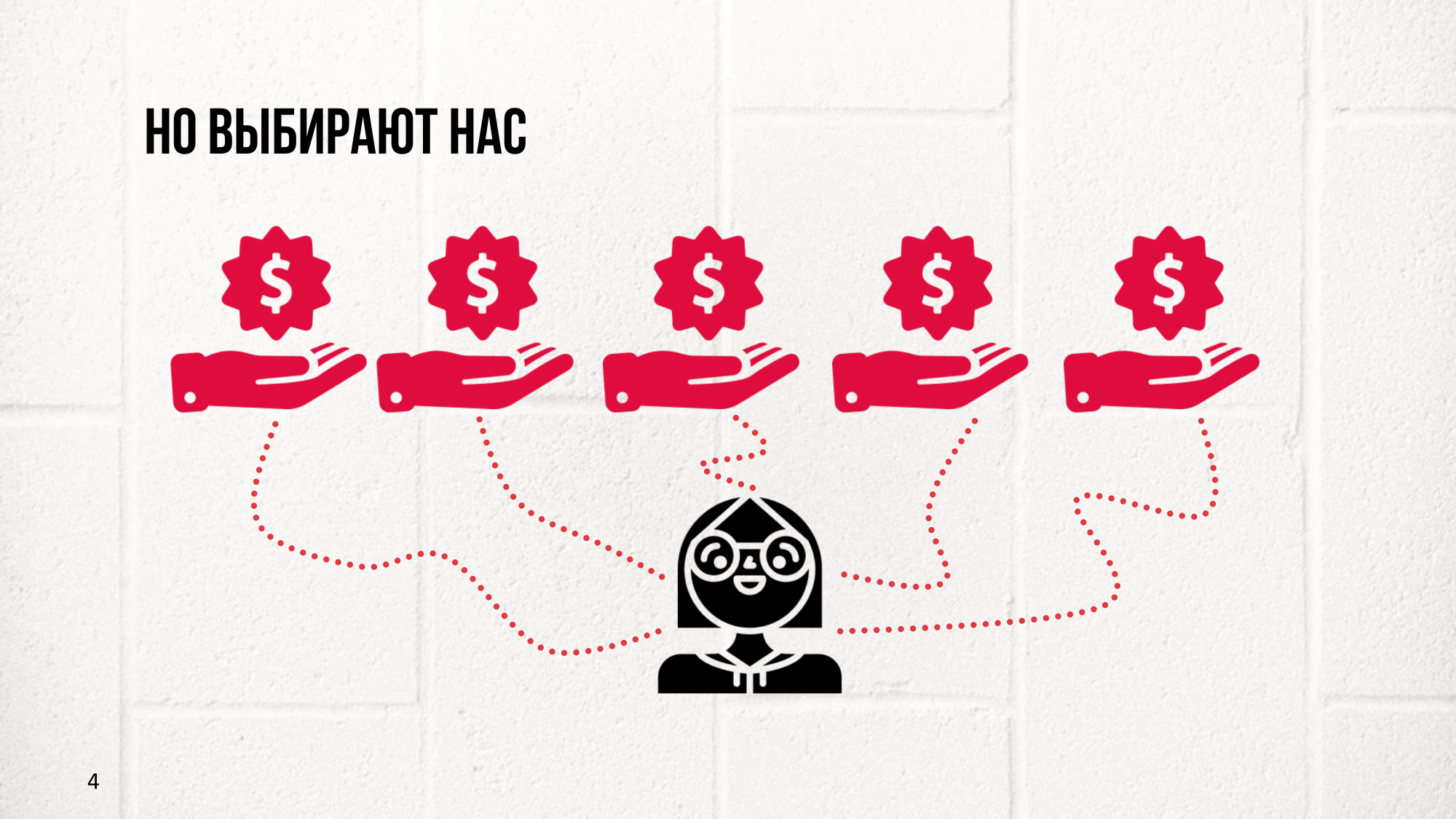
If before the candidate chose between several invitations for interviews, now he chooses between specific offers with optimal offers. Now developers on average receive from three to five offers.
Team selection cannot be delegated
No matter how much you want to delegate this process to someone, you can not get away from the hiring process . One of the manager’s key tasks is to recruit and retain strong candidates.
Suppose you are lucky, there are HR managers who bring in a stream of specialists for an interview, and the company has developed an HR brand. But the decision about whether to become part of the team, the candidate makes during an interview with you.
Therefore, the report is divided into three parts:
- what to do before the interview to increase the flow of candidates
- how to conduct an interview so that candidates become employees
- how to make the candidate “not intercepted” after the interview
Before the interview
We form a portrait of the candidate based on the tasks that the specialist should perform. Even before the interview, you need to understand how we will evaluate his work, how he will pass the probationary period, what he will do in six months, in a year, what set of required skills is needed, what tasks he should be engaged in at the previous place of work in order to cope with similar tasks with us. As a result of searching for answers to these questions, you get a description of the position and a list of questions for the interview.
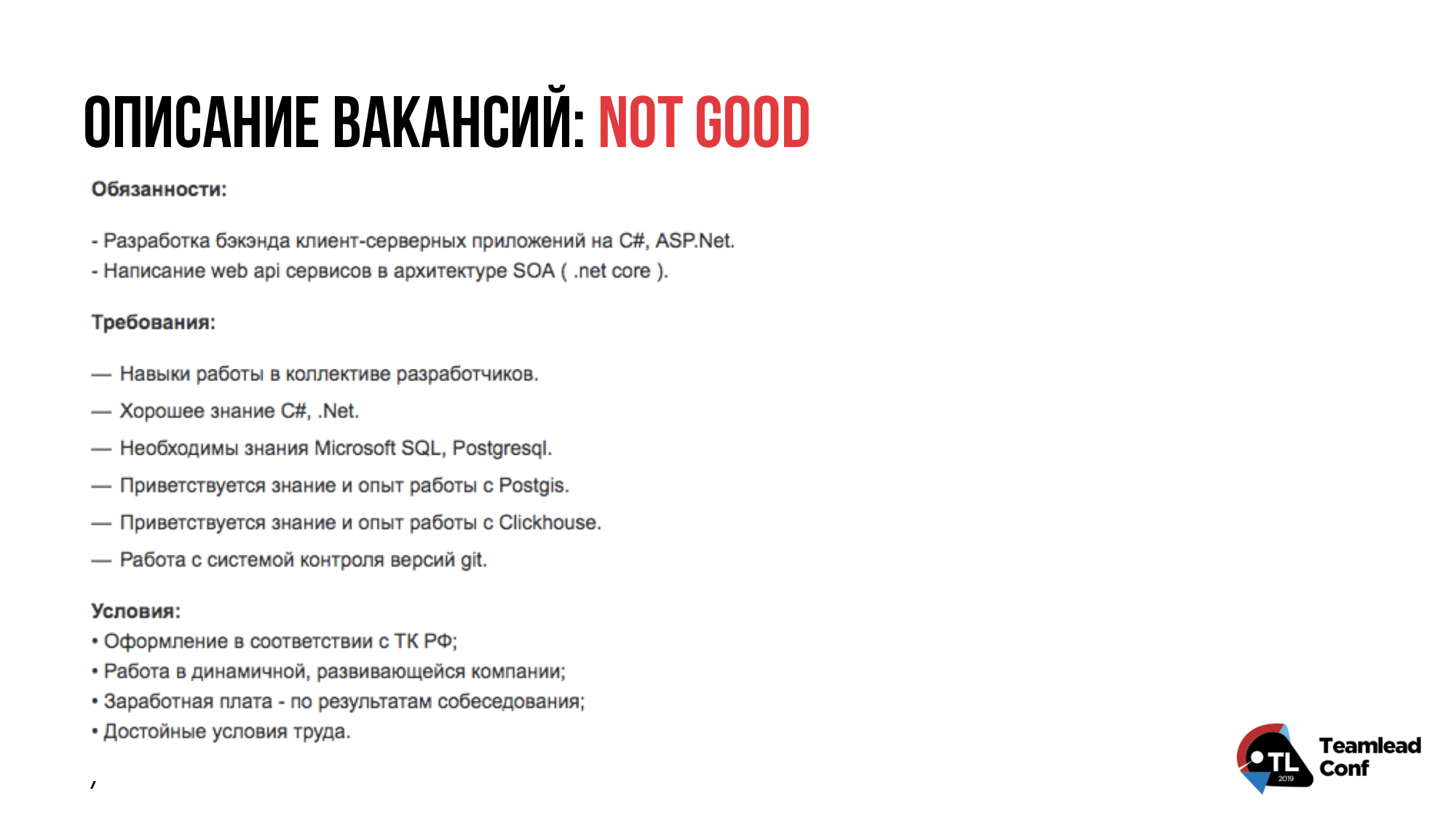
If it is possible to delegate the creation of a vacancy, then check the result, whether it will be interesting for a person to respond to this position.
In the vacancy above, there is one mistake that is painful enough for the candidate: two obscure tasks and a bunch of requirements. But this is not a bad example, the worst that I have seen is two tasks against fifteen requirements.
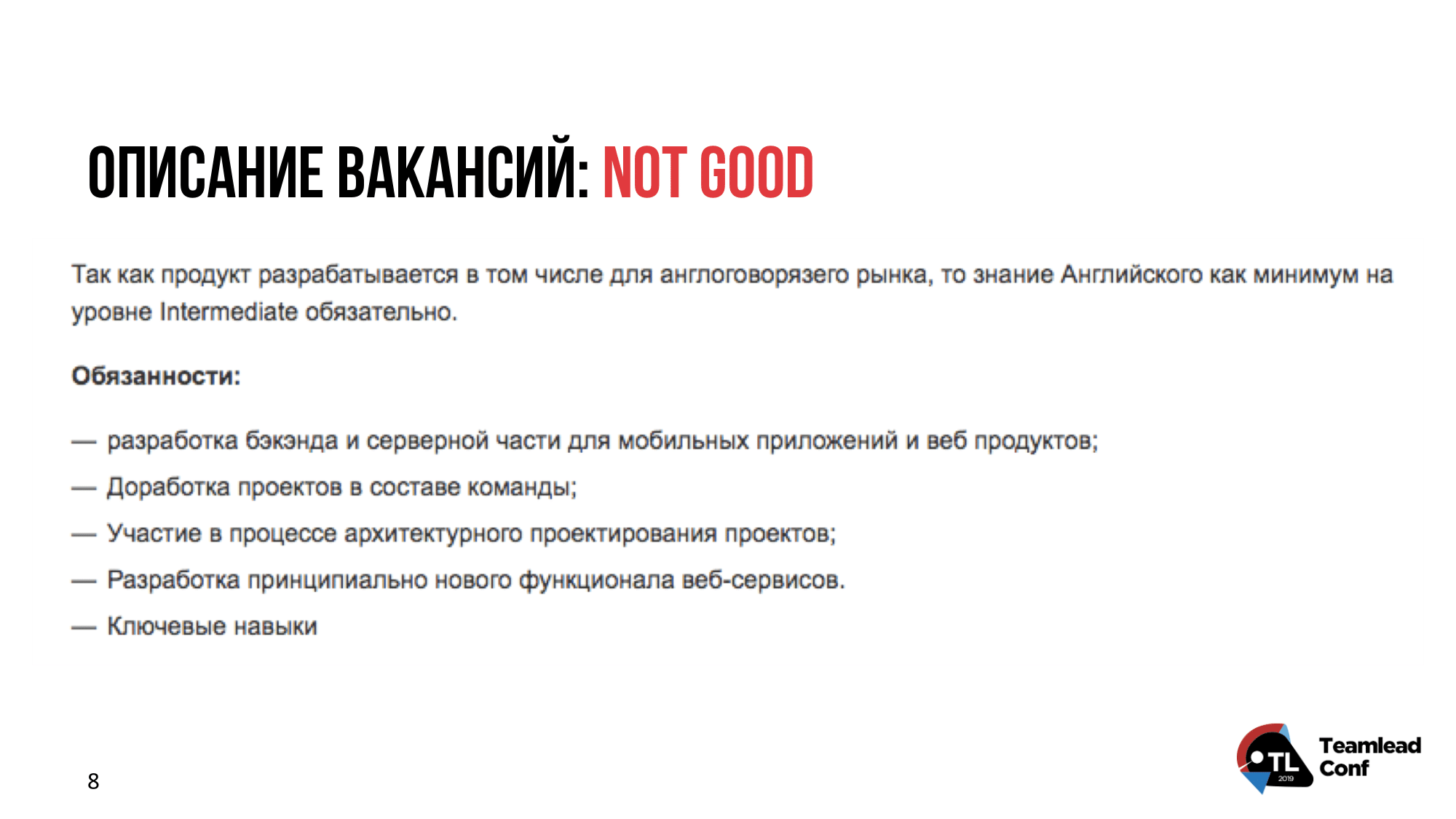
The developer has strong qualities of attentiveness and thoughtfulness. How do we want to interest the candidate by making typos in the text of the vacancy?
I am not saying that the correct description of a vacancy is a panacea and will definitely affect the incoming flow. But when you have a small and unknown company, the job description is the first HR-brand tool , a source of attracting candidates, in fact, your voice.
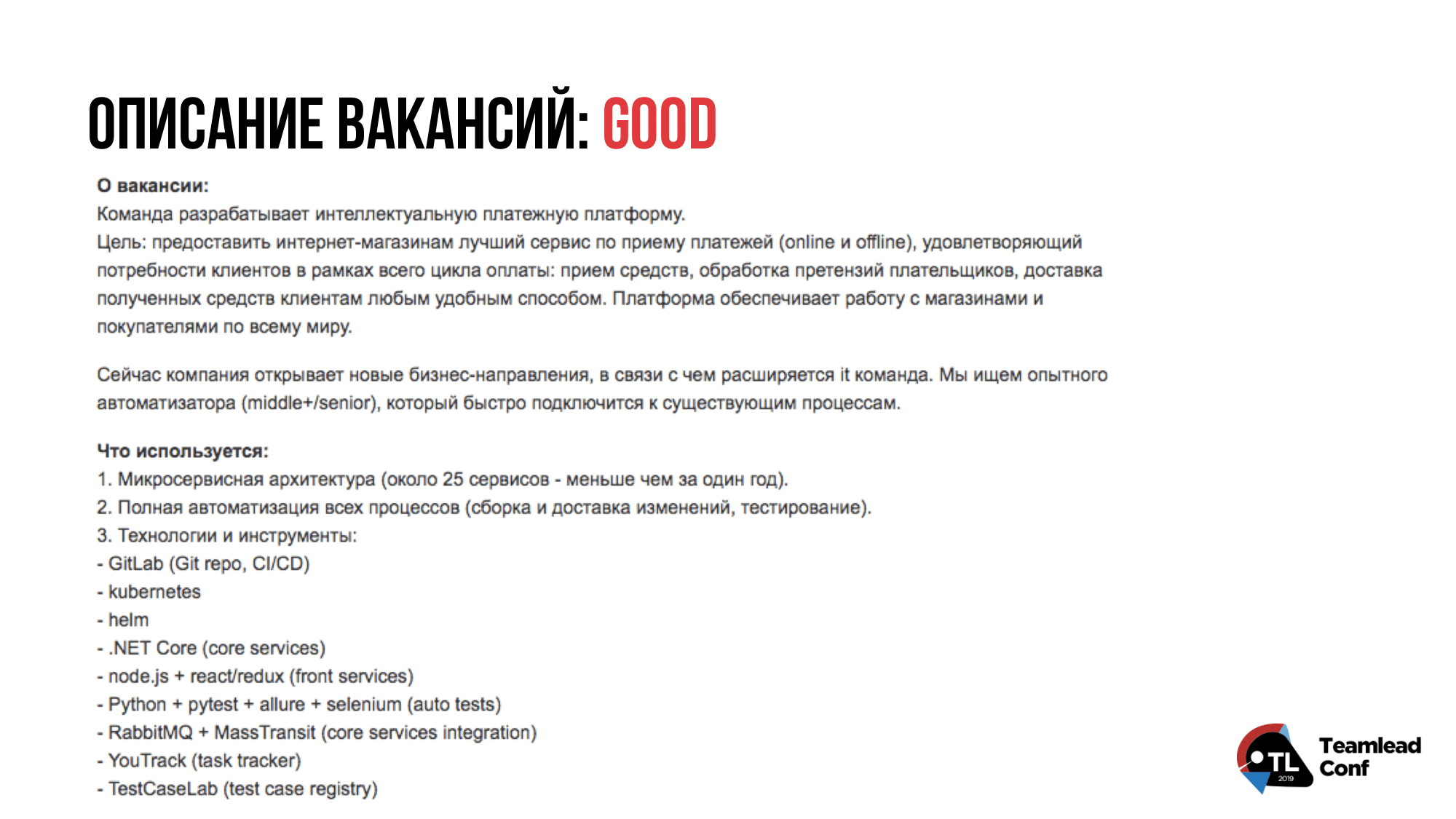
In this description, there is an answer to why the position is open, company technologies are described in detail. And this description is noteworthy in that a small team on its own was able to find 40 developers for a year. From the description it’s clear that at least going to an interview with this team is interesting.
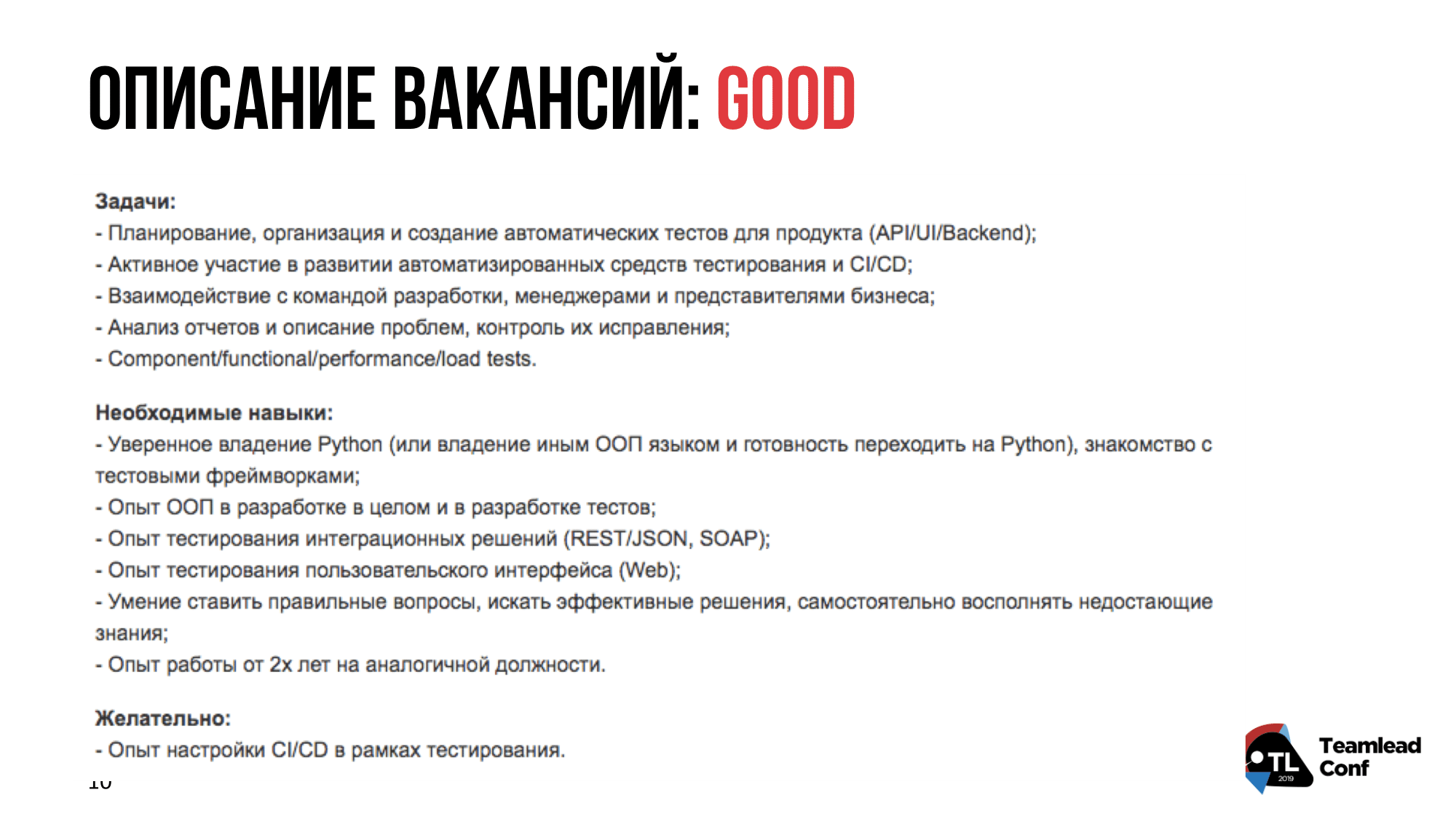
Not the fact that the censorship of the HR manager may miss the job description. For example, there is the phrase "independently fill in the missing knowledge." This can only be written by a team leader who is demanding of the team, advocates self-development, but he does not want to somehow inspire people to do this, he wants to find those who will be initially involved in this process. Such a phrase is more important than "the desire for self-development."
Where can a candidate be? Why would he want to go to us?
Job descriptions alone cannot attract candidates. Once the founder of one IoT project shared that he could not find a Python developer. I asked if the technical director posted the position on my page. Founder replied that no, because he is not a public person, he’d better place it himself. I managed to convey that the target audience of the founder is marketers, sales, the same founders, anyone. And the technical director, who stood at the origins of the company and created the system from scratch, had 200 people in friends, but these were the people with whom he intersects at conferences, with whom he studied together. Thanks to this placement, several candidates began to process in the company in a week.
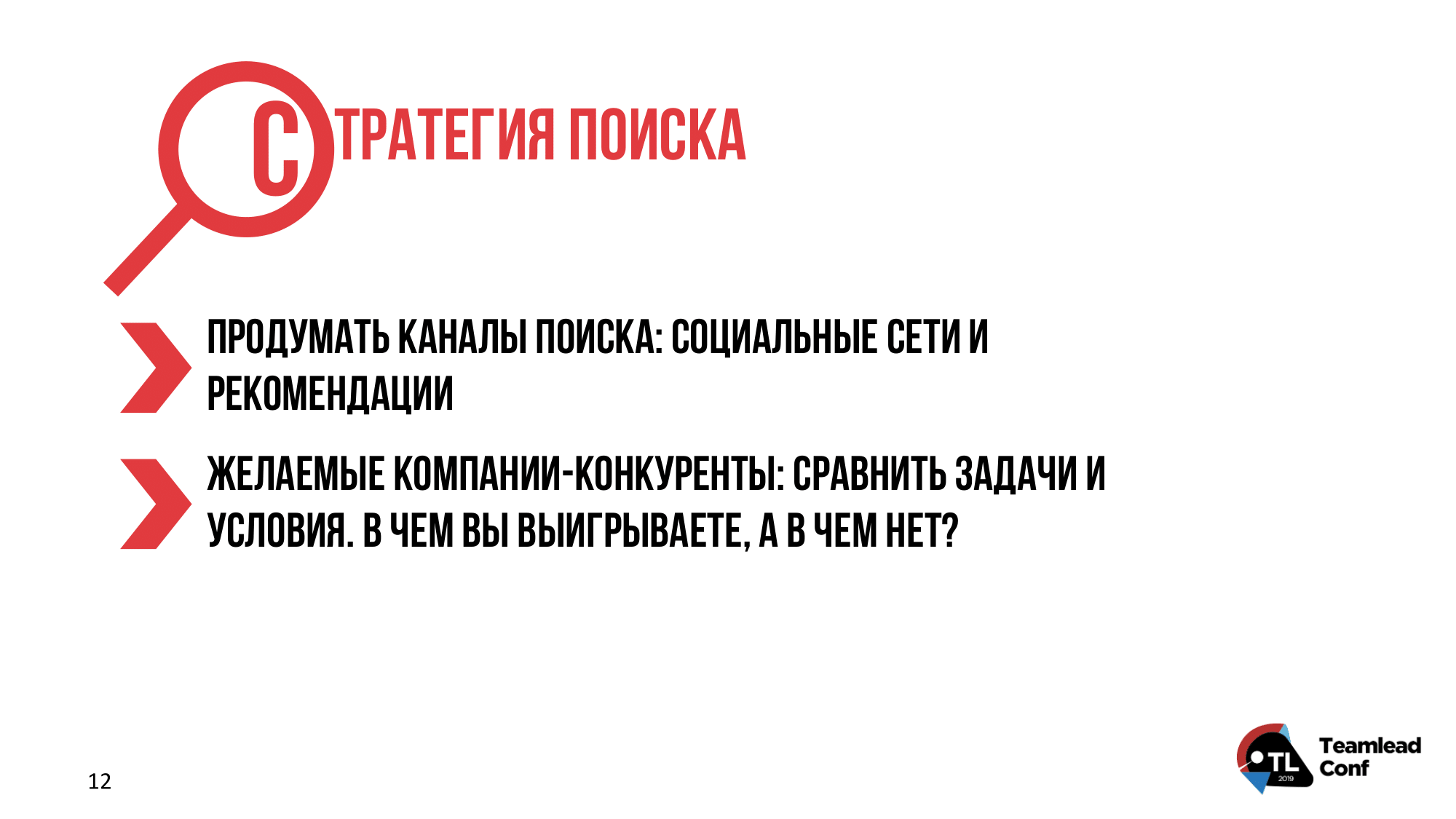
At the very start of the search for candidates, make a list of 10-20 people from the field that you know and can ask for a service, whether it’s a post about your open position or direct recommendations for specialists who may be suitable for the position. It works.
Analyze competitors' offers in advance: you can take some of the information from offers from other companies that come to you. You can create a comparative table with their proposals, and understand how to line up with competitors, how your team differs.
Do not forget about Telegram channels and chats, their administrators have a positive attitude to posts from team leaders, not recruiters, this should be used.
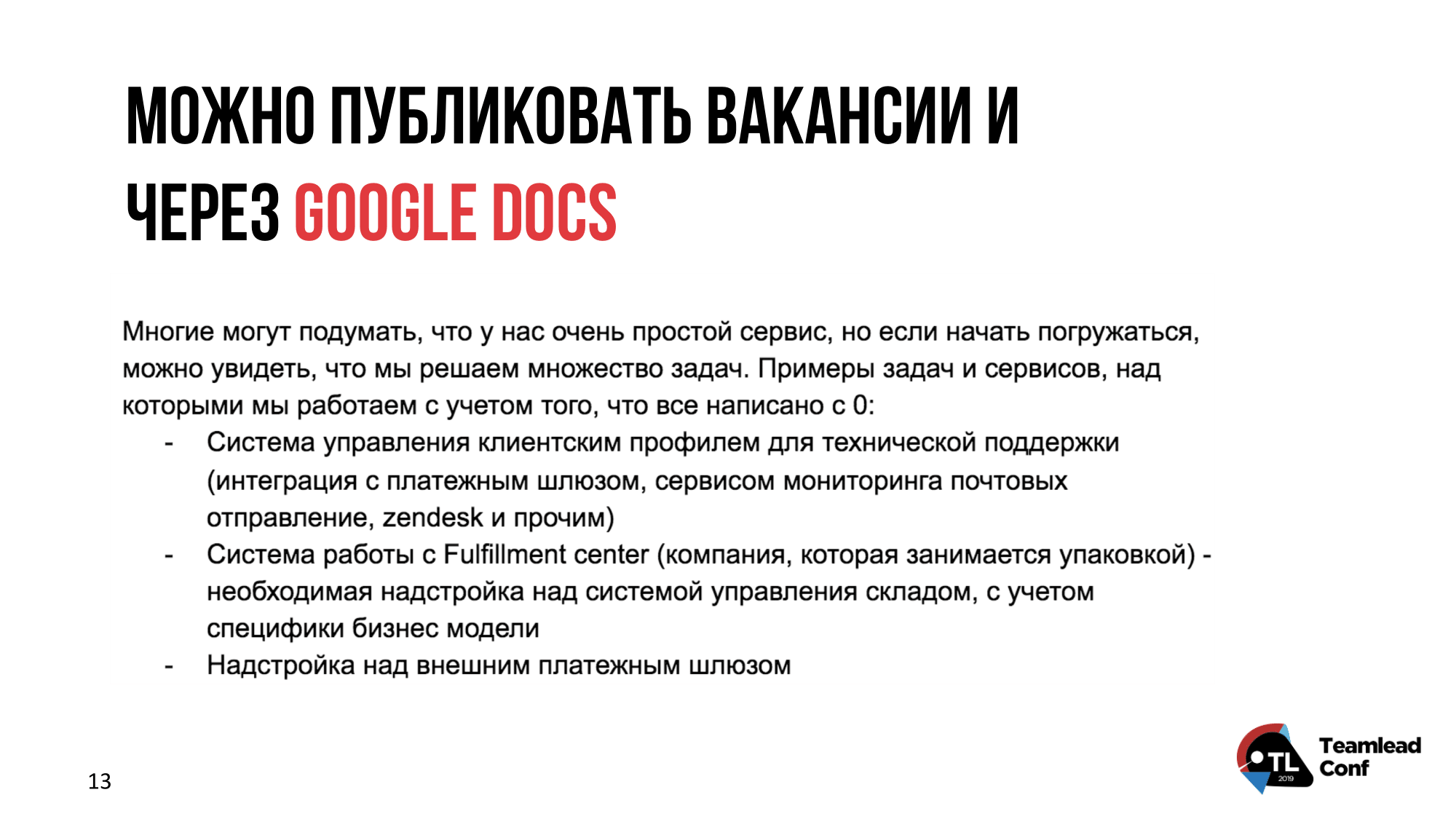
Speaking about the budget for channels for attracting candidates, I believe that everything that can be done for free should be done for free. Some teams that have only a development office in Russia or have a large part of their employees are sometimes just sending out Google Docs with job opportunities in chat rooms and increasing the incoming flow of candidates. In Google Docs you are not limited by anything, you can create a structure that is convenient, write in the first person and list all the vacancies that are open.

Have you heard about the A-players theory? This is about the fact that there are class “A” candidates, they are so purposeful, focused on self-development, they have high ambitions and so on.
I’ll tell you about our unsuccessful case. An international company with excellent conditions, business trips to Europe, was looking for a class “A” candidate who would use new technologies in his work. In an interview, they asked for examples of how this manifested itself in life and refused to those candidates who could not tell anything. It seems logical, but it was about a year and a half ago, and the company used the first Angular. We understand that it is difficult for a specialist with free English who uses new technologies in his work to find motivation to work with a dead-end, in his opinion, technology.
Class “A” applicants must meet the objectives of the project. Tasks with code refactoring, support - this is for specialists who are interested in stability, they are not interested in constant turbulence. There is a task - and for each task there is a person.
How to interview
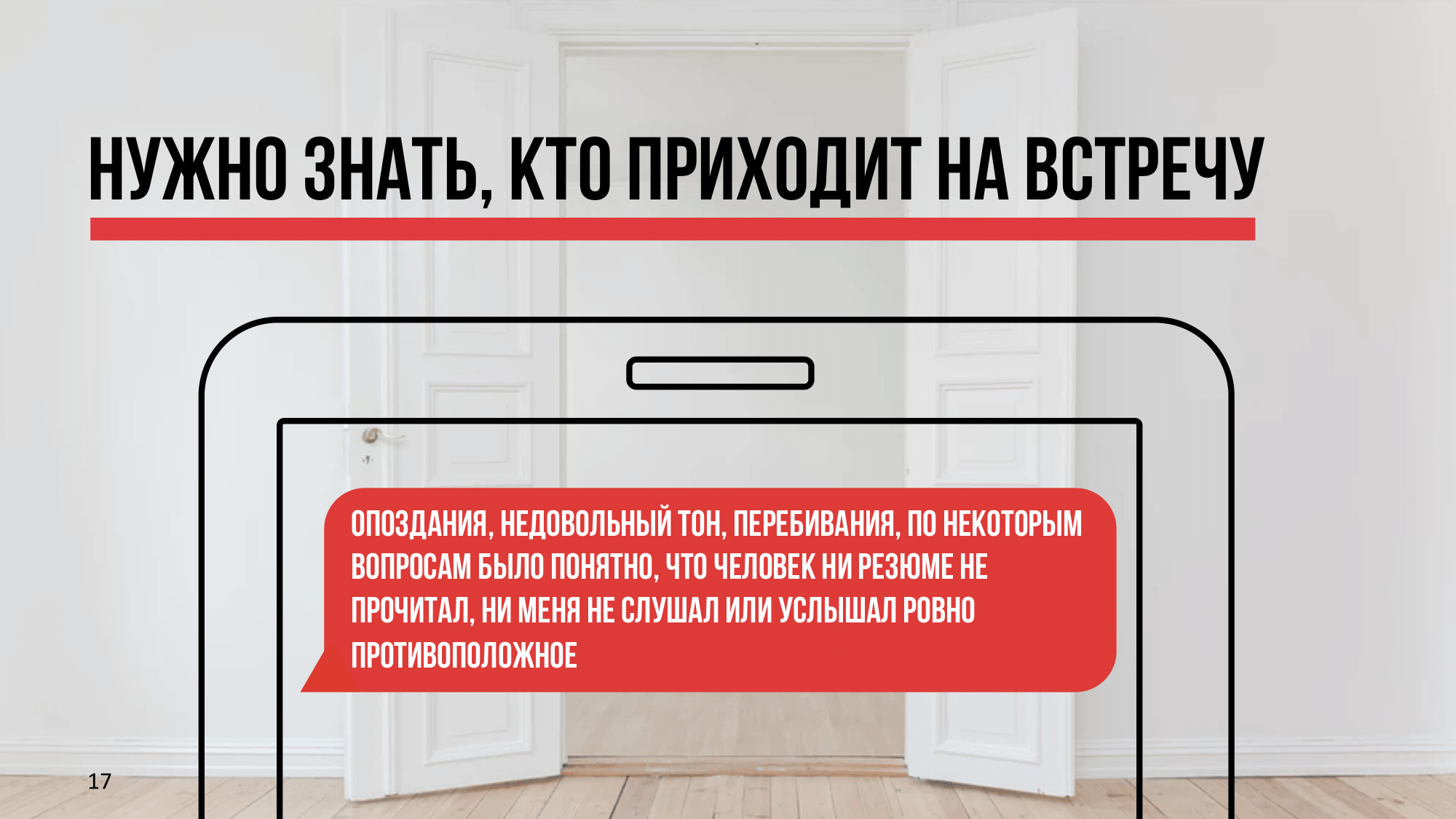
On the slides are reviews of candidates about interviews, authorship is hidden.
If a candidate comes to the interview who does not know anything about the company, then we will refuse such a person. But I would very much like that kind of feedback, as on a slide, rarely came to us. This is a rather emotional feedback, but more often messages come in the spirit: “I think the team leader just got acquainted with my resume.” This spoils the first impression of the company, and after all, an interview is one of the main weapons in order to interest the candidate and keep him. I set myself a reminder before the interview on the Google calendar not in 10 minutes, but in half an hour in order to read the resume and understand what questions I want to ask at the meeting .

An interview is stress for a candidate. Few people say: “Oh, I love to go for interviews so much!” - as a rule, they often change jobs. I understand that the life expectancy of a candidate is reduced to one and a half years at one place of work and communication skills are being promoted, but for those for whom job search is not a key story, interviews are a pain.
Familiar team leaders see the structure of the interview approximately like this: 40 minutes - a technical interview, 10 minutes - questions for interaction with the team, 10 minutes - for the candidate's questions. The candidate goes through several such iterations, while a technical interview can take place with a stone face without feedback, and then comes to any interview with the feeling that he will now pass the exam.
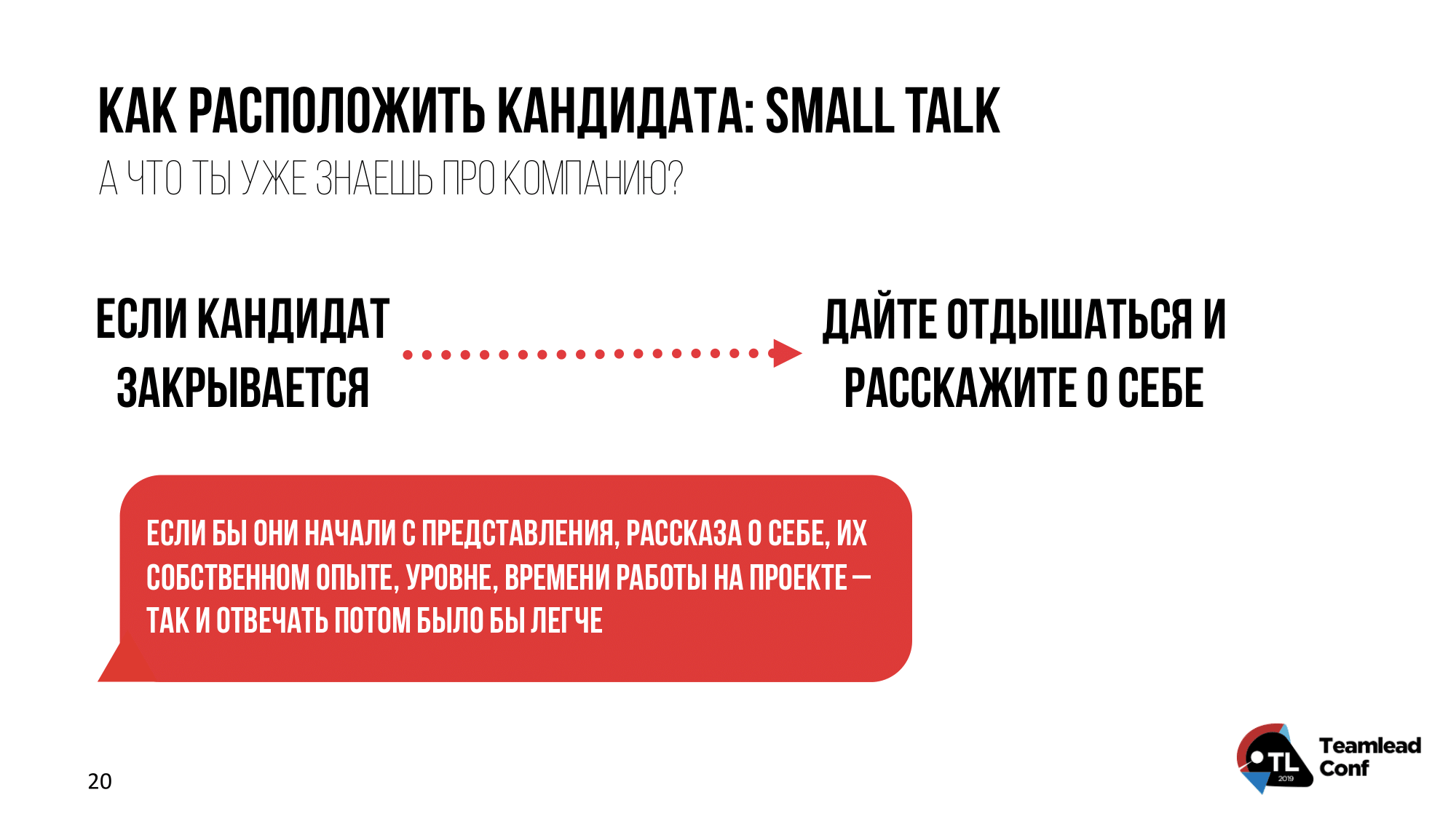
Therefore, you need a "Small Talk", an easy conversation. Someone advises to offer tea / coffee or ask about the weather, but these are too obvious and far from relaxing stories. But if we start a story about ourselves, we will soon feel that the candidate begins to calm down and smile, stops worrying, then you can already start asking questions. For example, if you just told how the development processes are arranged for you, ask the candidate what he thinks about it.

Another reason to worry in an interview is the unknown. Sounding the interview structure disciplines us in advance and helps the candidate understand what you will ask him and why.
I will touch on the area of questions in theory. I understand that this is of great importance, but if you want to ask them, then think over the structure. One team leader did not want to move away from questions on the theory, and the candidates gave feedback in the spirit: “all the questions were on the theory, nothing interesting, I think I won’t learn anything there, I can’t continue the dialogue with the company.” We love to solve problems by nature, we want to do something complicated, and not remember some formulas. They changed the structure of the interview, left some of the questions in theory and added practical tasks. At the interview, the team leader says: "It is extremely important for me that you know the theory, it unites us, I would like you to join the team." In this case, there is an explanation why it is necessary to briefly return to the university bench.
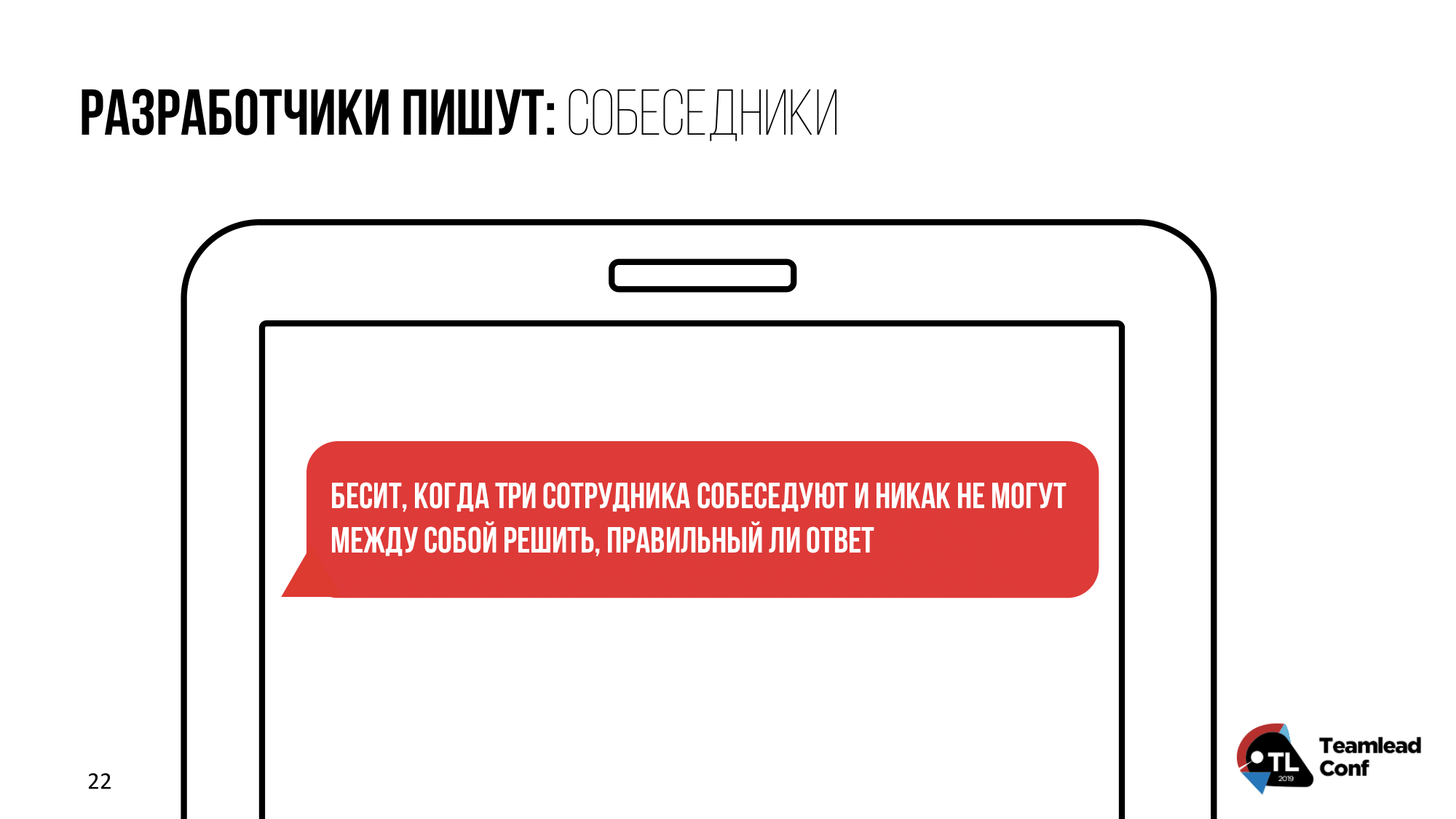
Another question of uncertainty is the number of people at the interview. It’s even scary when they start arguing among themselves or talking aloud “we can look at you in this position or we can’t” or when the candidate does not know what kind of people break in during the interview. This is terrible stress that can scare the candidate.
There was a case when, during an interview with a front-end developer, an expat CEO burst in the last 10 minutes - it is good that the candidate knew English. Before that, they did not explain to him that the general director was briefly in Moscow and that these 10 minutes allowed him to be put on the same day, and not to postpone the decision for several days. The candidate was so scared, because the expat had French English at the meeting, the developer could not be reconstructed and thought he had failed the interview. Fortunately, we were quickly given feedback that everything is fine and we were able to explain everything to the candidate. But if the feedback dragged on, I think that everything would end sadly.
How to get around the first impression: we choose the method of collecting facts
We like to interview those who are like us. It’s hard to rebuild from this, but it’s important to remember that if I am looking for a successor, I can afford it, but if we need to strengthen the team, then we must find those who will add new skills to the team.
Remember, interviews are stressful for a candidate? We have a candidate who is very worried about the interview, but his help is in good recommendations for his work and he, knowing his excitement at the interview, is ready to do a test task at a meeting or finish it at home in order to better demonstrate his abilities.
Try to refute your first impression of the candidate, but in no case think out the answers for him to adjust to your impression - this turns into a game with yourself.
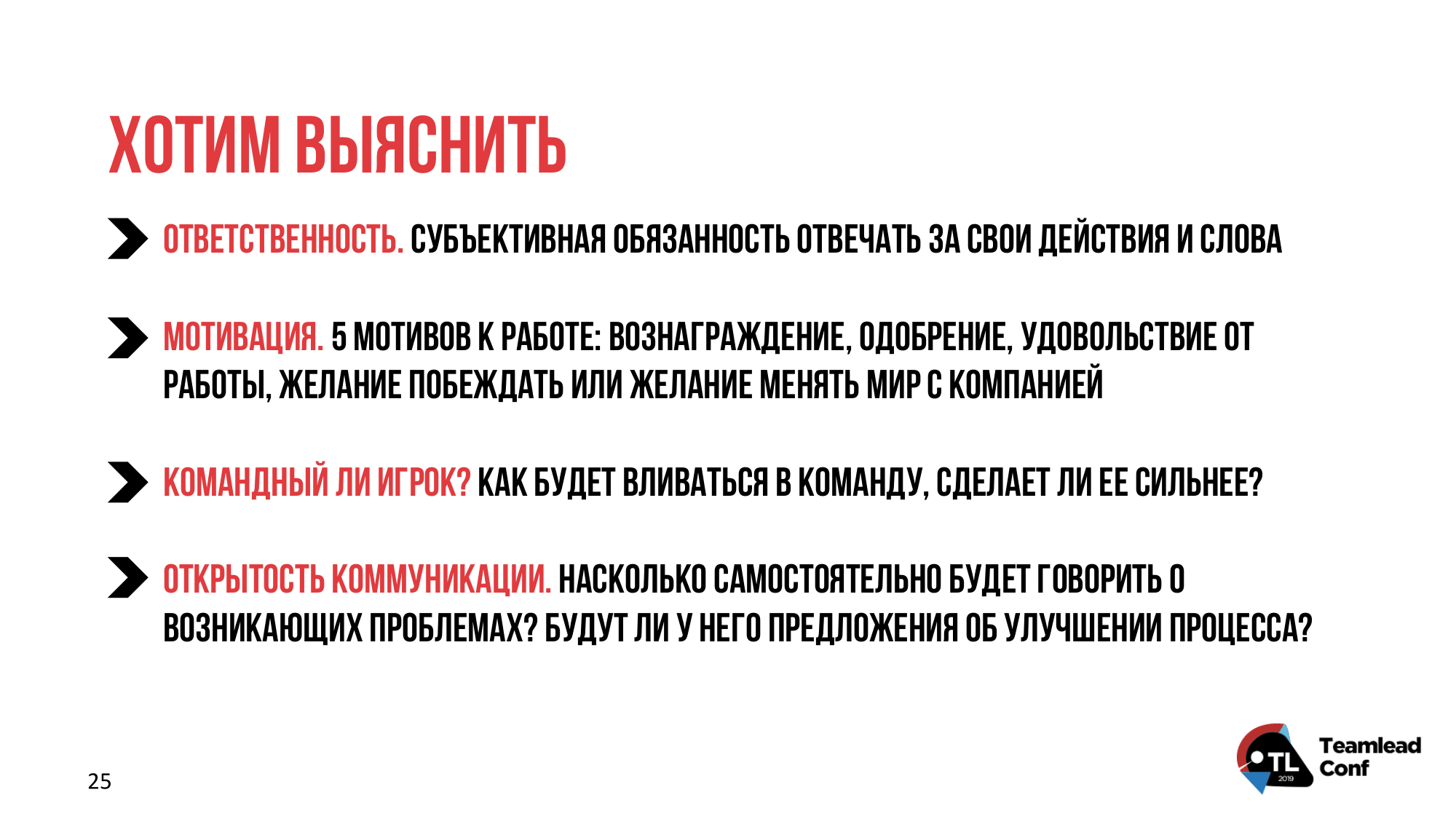
We want to be sure that he will definitely carry out the tasks that we will give the person. If he encounters any problem, he will say about it. The team will maintain an atmosphere of mutual assistance, mutual assistance, and employees, at least, will go to dinner together. How to find out?
It is not necessary to ask the question: “Do you consider yourself a responsible person?” This can always be read between the lines. For example, you can ask the question: “If our interview goes well, at what point are you ready to join the team?” And look at the candidate’s answers. I propose to consider an example.
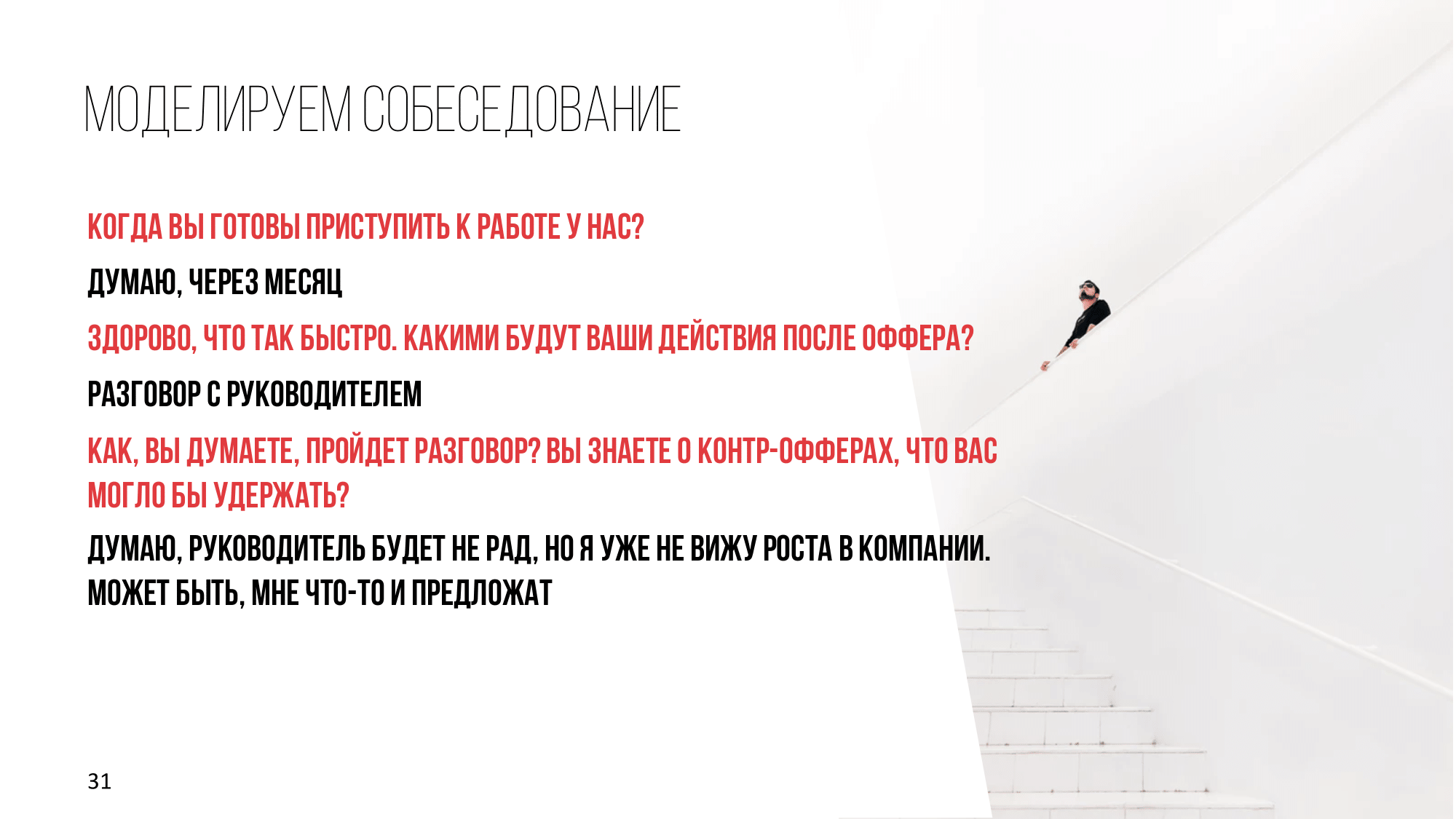
“I think that the manager will not be happy” - the standard answer, if the manager is sorry to part with the specialist, so there may be counter-offers, you need to say this.
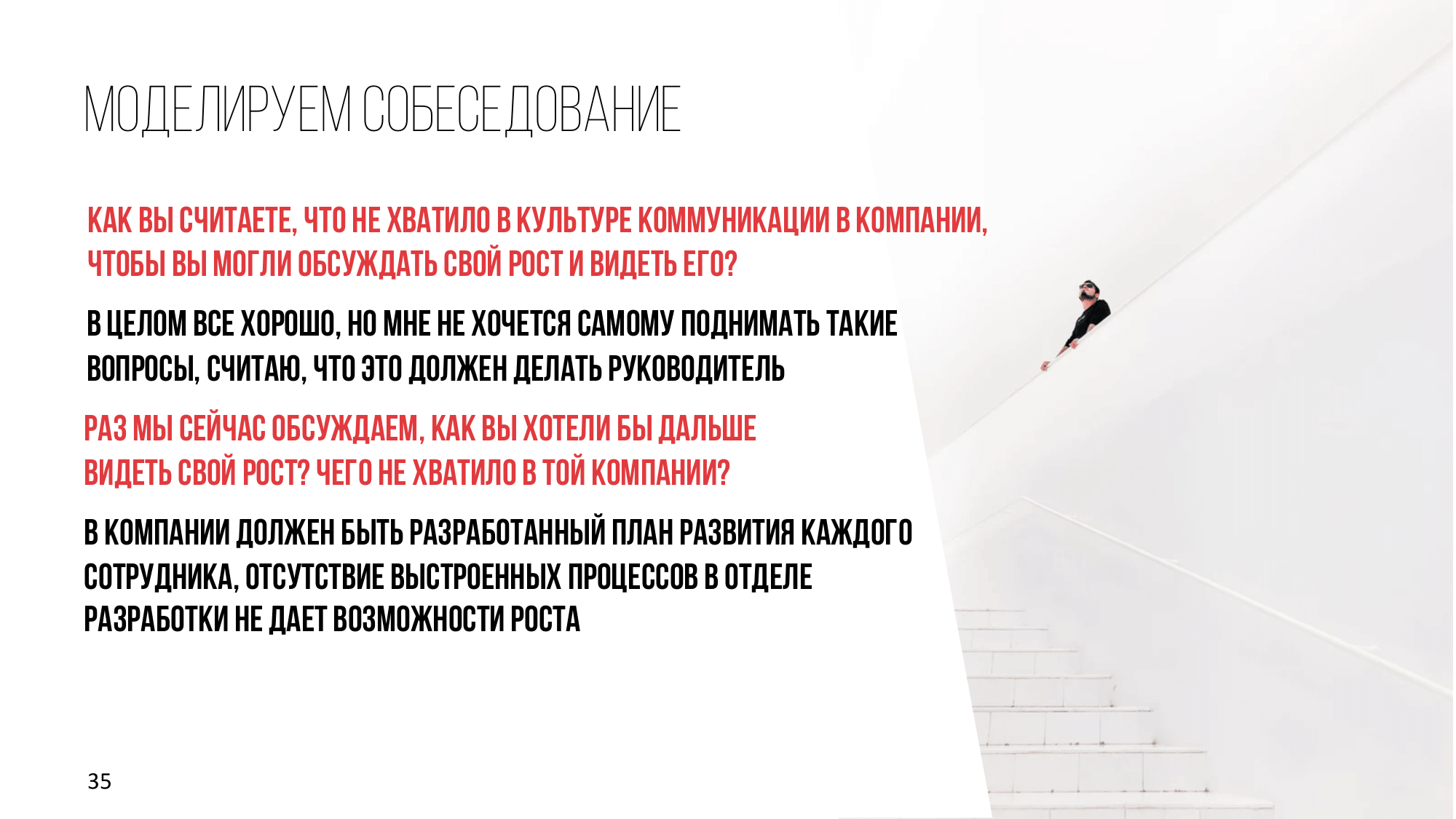
We are interested in how the candidate builds communication with the leader and how he sees his potential growth. But we will ask "back streets".
“I want the company to have a well-thought-out employee development strategy” is the top among the candidates' answers in 2018-2019.

In the slide above, we want to understand what motivates the candidate, how to measure his effectiveness in the future.

Let's try to interpret the answers. They are maximized, shortened, but the essence is preserved.
It is important to ask about the transfer of cases, because if a person has a big responsibility, it is difficult for him to leave in 2 weeks . If he can leave in two weeks, then there are several scenarios: the candidate has already discussed leaving with the leader, the team has greatly reduced the volume of tasks, or his area of responsibility is not so large. It’s good when the candidate says something like: “I need to talk with the manager and understand to whom and how I will transfer the case”, such an answer means that he cares.
Why would criticism be painful for this candidate? If positive feedback motivates him, then negative will motivate him. For professional development, it is extremely important to receive negative feedback and be able to work with it.
And about motivation. When a candidate wants a developed development plan, most likely, he wants a titular career growth: “I want to know when I will become a second-rank programmer, leader, team leader.”

About the openness of the candidate. We want employees to talk about the problems that arise. When a candidate is guided by an external reference (“such questions should be raised by the head”), this means that he most likely will not share his problem and initiative.
The teamwork of the employee can be tracked by the transfer of cases. His colleague will be hurt, at least with a sharp transfer of affairs. It’s a good sign when a candidate says “I will try to help find someone to replace” .
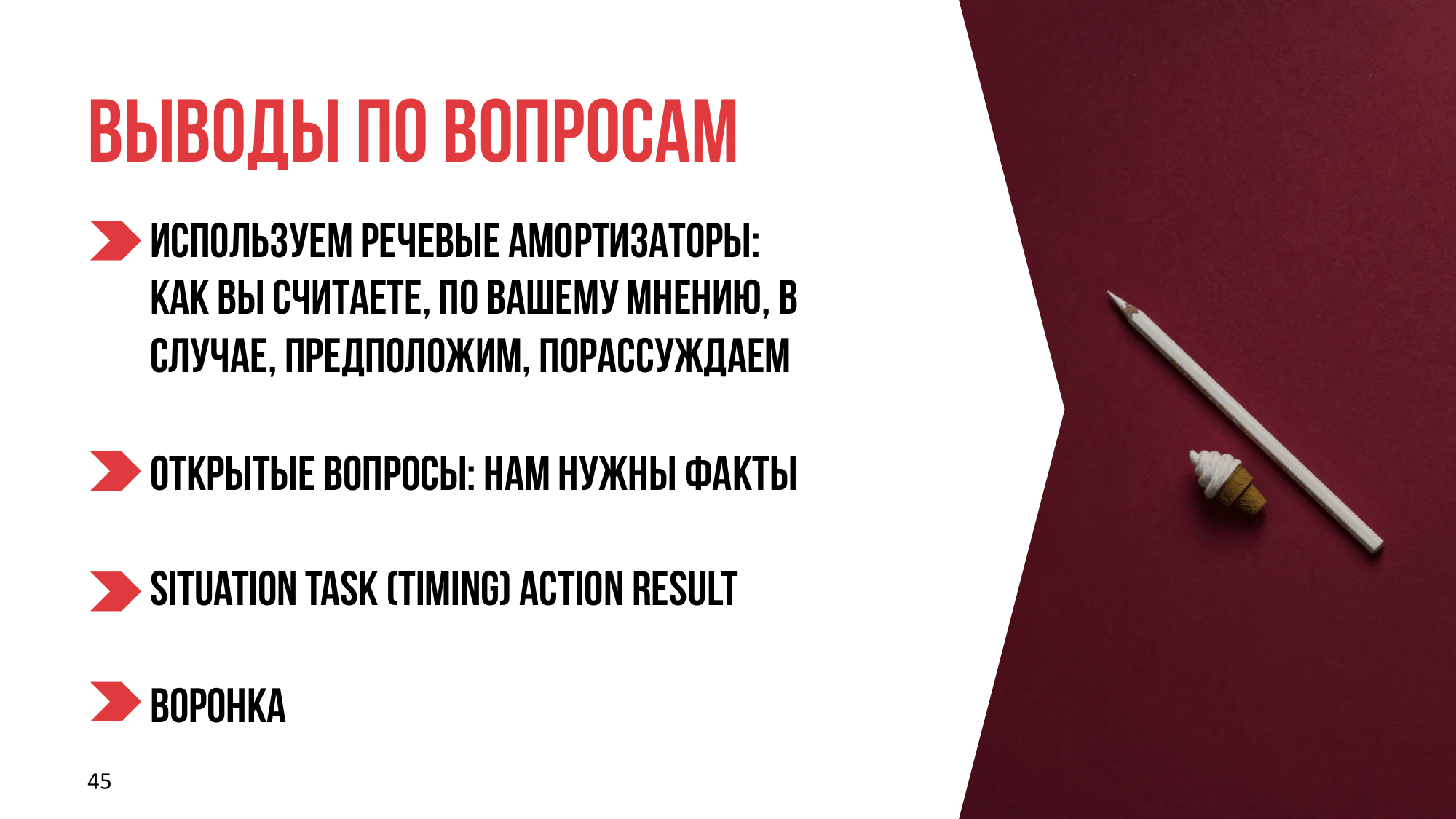
What questions to ask at the interview? My favorite approach is the funnel method. We need to know what situation the candidate was in, what the task was, what were the deadlines, what did he do, what were the results - this means that he sees the integrity of the picture of his actions.
All questions must be open. If we ask a person “Are you a responsible person?”, He will simply confirm this. By the way, to form questions for an interview, you can train within the team .
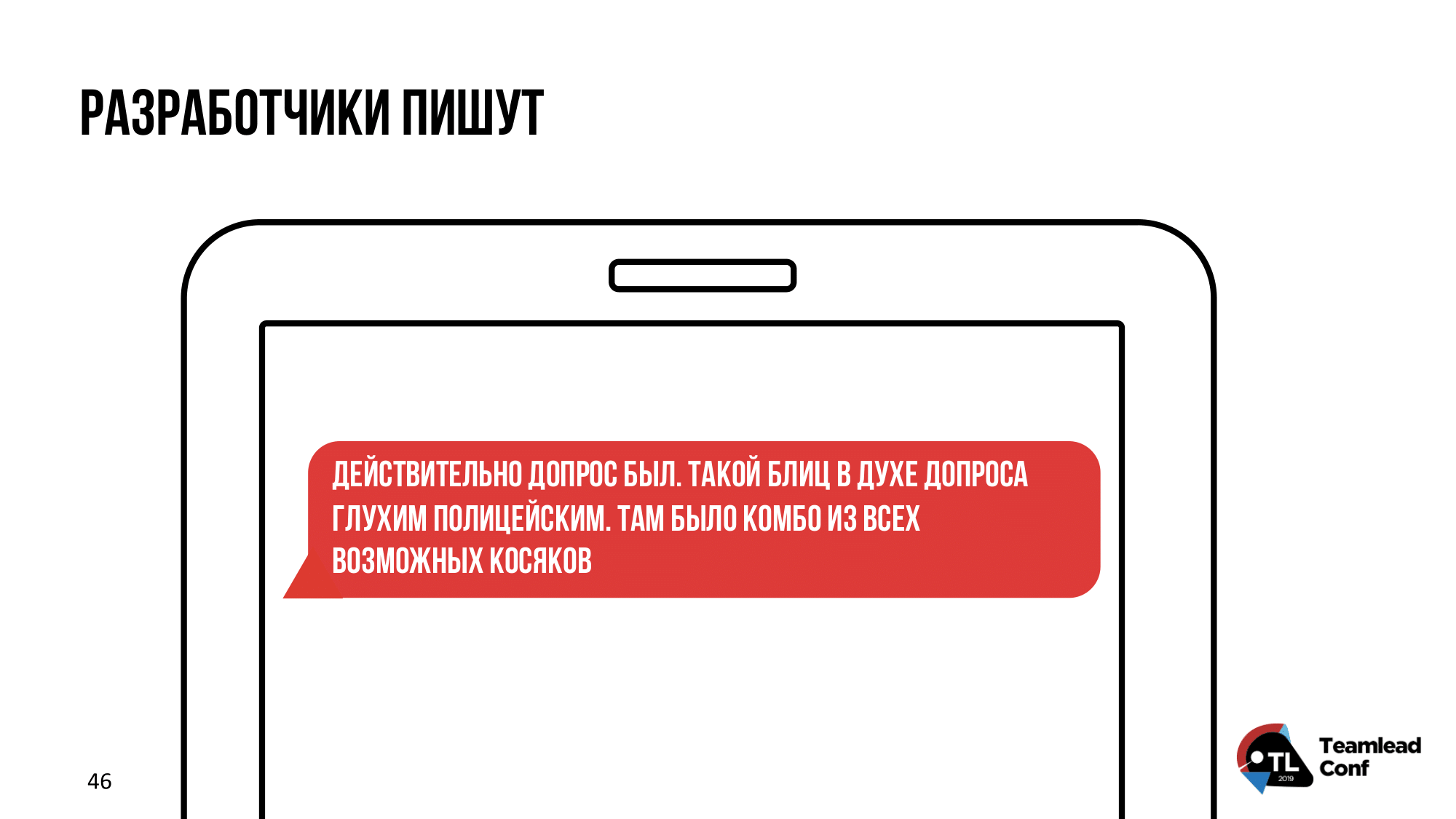
Being carried away by interviews, you need to remember that this is a two-way exchange of information. This is communication, not interrogation, and if the outcome is good, you will need to talk further with the candidate. For the same reason, it is better not to cross personal boundaries in an interview — each has his own.
After the interview
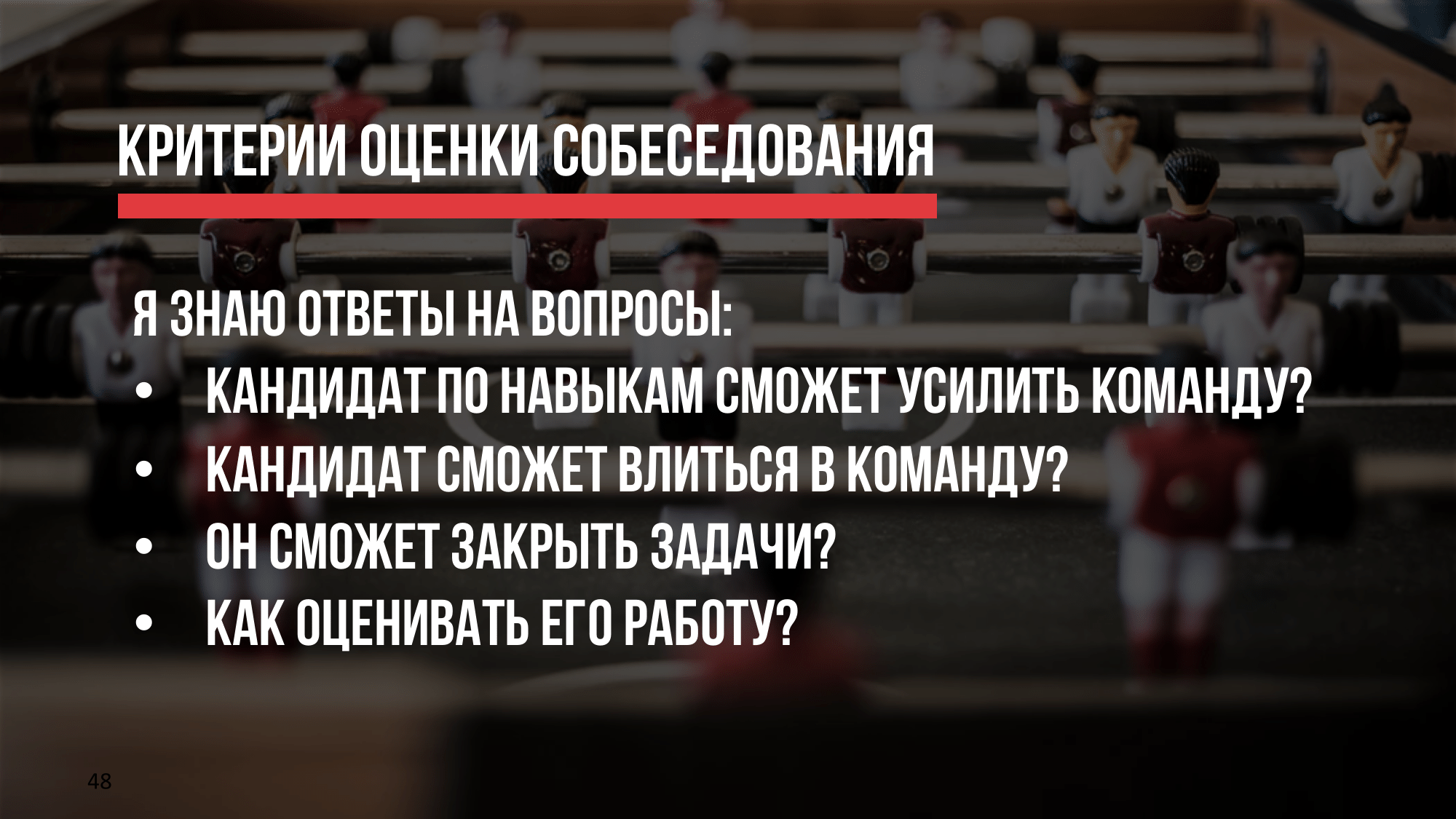
When you find out whether a person will join the team or not, the most important thing to remember is whether he can close the tasks of the business. If both needs are closed, then we can assume that the interview was successful.

Recommendations should always be asked, even for those candidates you feel like . Although sometimes it makes you feel awkward, it seems that you want to say: "Give me the contacts of your leader, I want to know how you really worked."
In this case, I refer to the fact that the company has a certain set of rules that is necessary in order to accept an employee into the team. You can ask the following question in an interview: “I really like how our meeting is going. Can I ask you for the manager’s contacts from the previous place of work? ”
Meeting results
The interview has several outcomes:
- we liked the candidate, we sell him the company at the end of the meeting
- we doubt the candidate and ask for a test task, but remembering open communication, we say what he should do and what he could not do at the meeting
- the candidate did not like , we must write a letter of refusal
But we must remember, the more contact points with those we liked, the better the result.
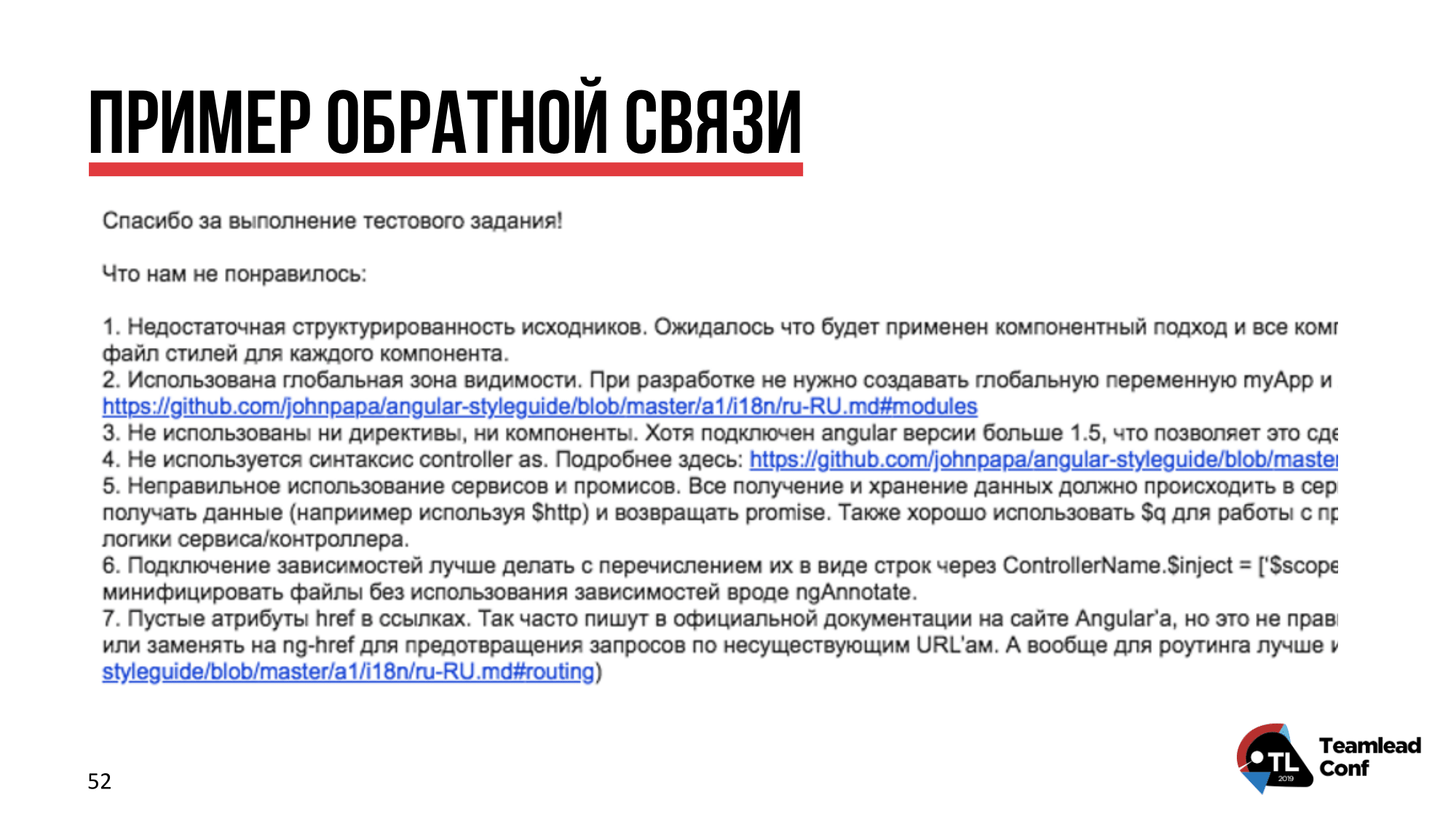
The pain of the market is the unspoken rule "if we did not respond within a week, this means that we refused you." This is not equivalent from the point of view of the candidate; he has invested time in communication with you and should receive feedback.
You can pre-collect links to resources and use them for rejection letters.To write something like: "You didn’t manage with us on the theoretical side, but I recommend you to subscribe to this blog." It works - at least you get a thank you message. If you don’t do this, you will receive negative feedback about your company.
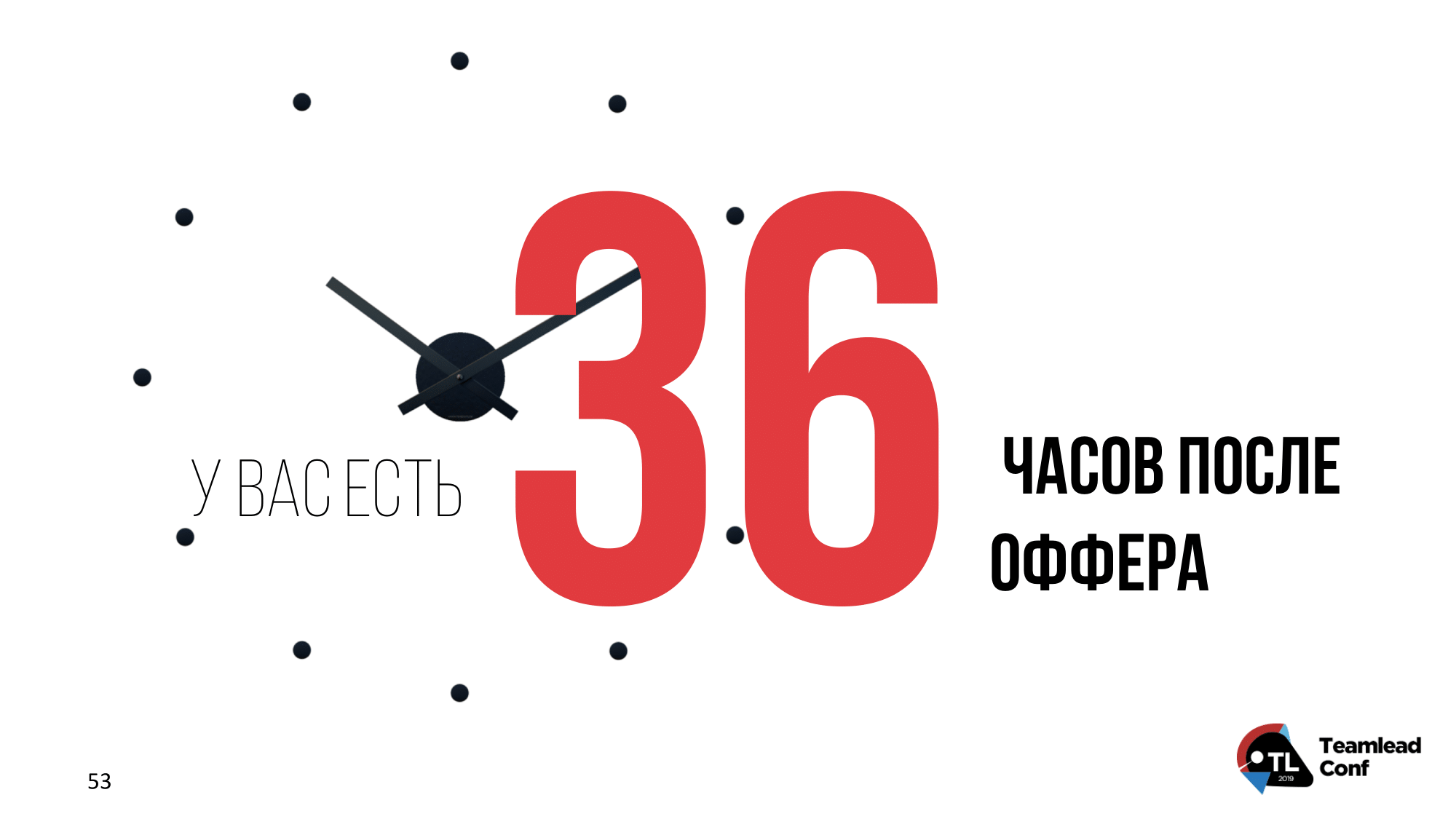
We remember that an average candidate receives 3-5 offers and chooses between them. If he does not respond within 36 hours, about one and a half days - this means that your proposal has a worthy competitor.
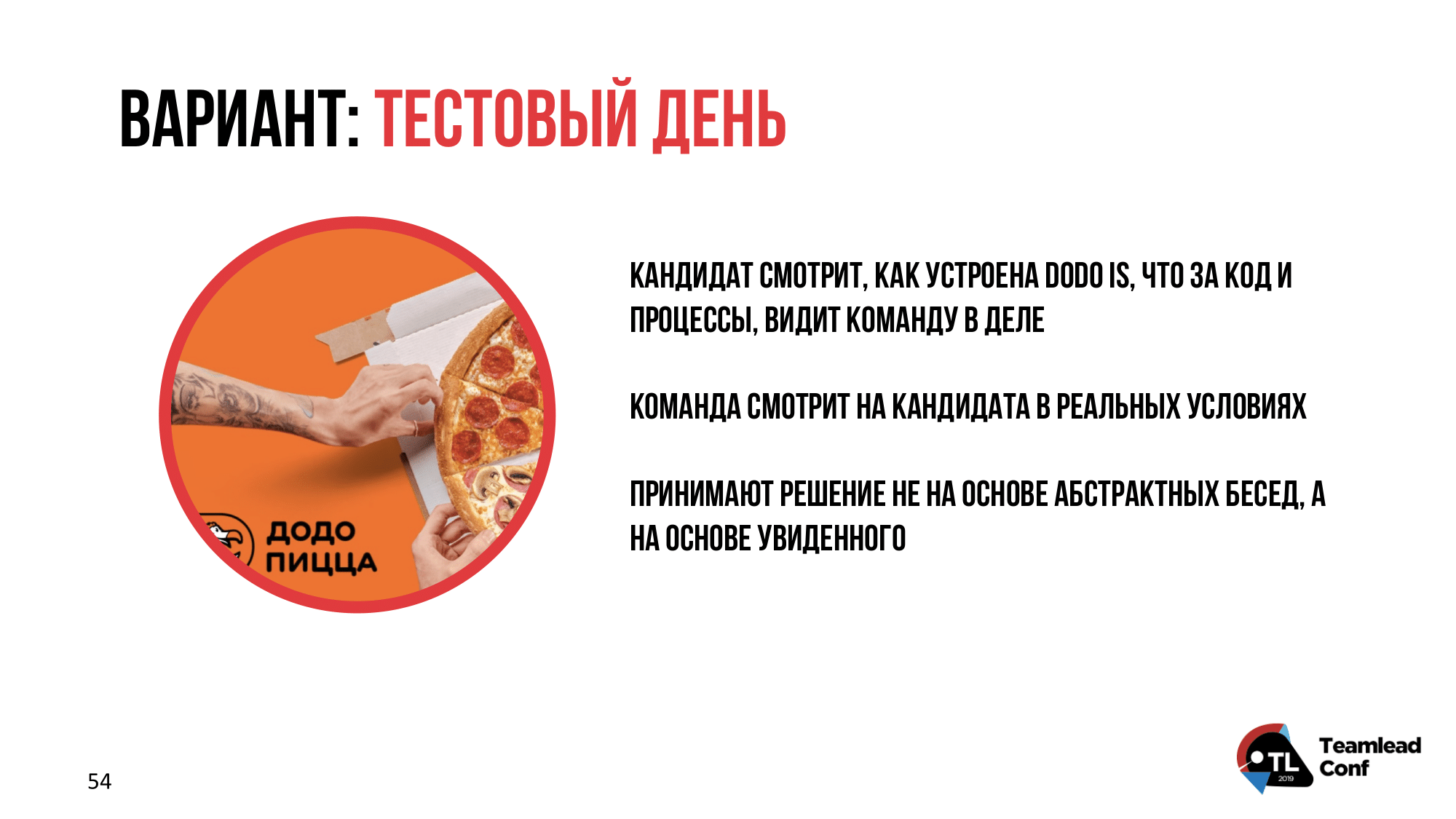
And this worthy competitor begins to act with prohibited methods. Dodo Pizza, for example, offers a test day, other companies invite them to meetups or an evening of board games, or a retrospective to get to know the team and processes better.
But evenif you have a small company, you don’t hold your own meetings, you can just invite the candidate to the meeting : “Let’s discuss the offer with you, you will ask me more questions about the vacancy, just discuss [some general topic from the interview]”. And it works. Otherwise, about 40% of the offers are so frustrated.
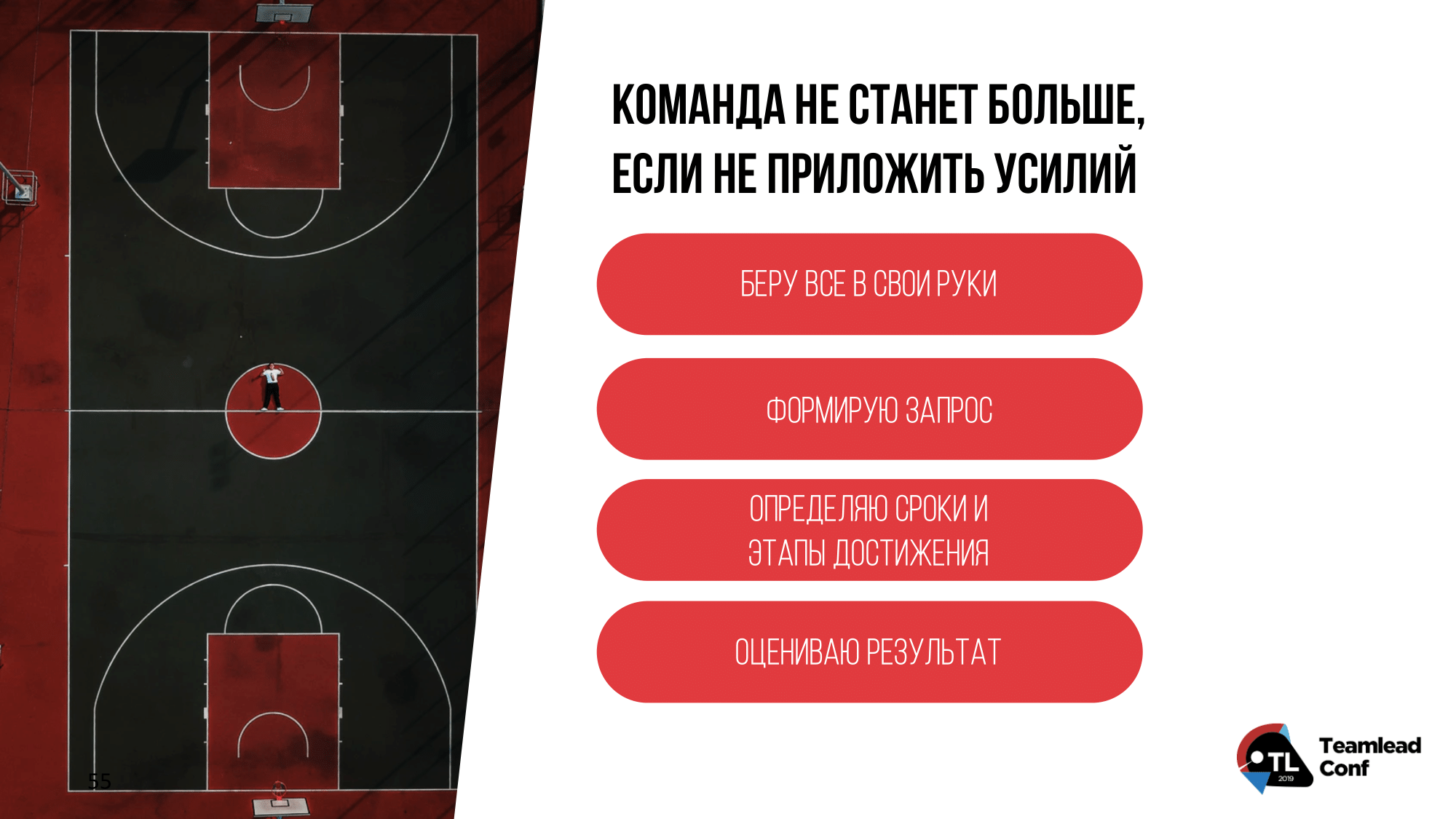
Make the hiring process transparent
Try to write down all the important information about the candidate right at the interview. You can create an Excel spreadsheet, list important criteria for a given position in it, and add the ability to score by points . Only I recommend choosing an odd number so that you can’t put something in the middle.
Thanks to the entries, you will have a documented recruitment process: from whom did you ask for recommendations, where did the candidates come from, what tasks did they fulfill. This means that at any time you can return to this document and do the work on the errors. For example, in one startup, they reviewed the vacancy requirements, and instead of candidates with experience on Vue, they took those who were willing to study it and thus expanded the funnel of candidates.
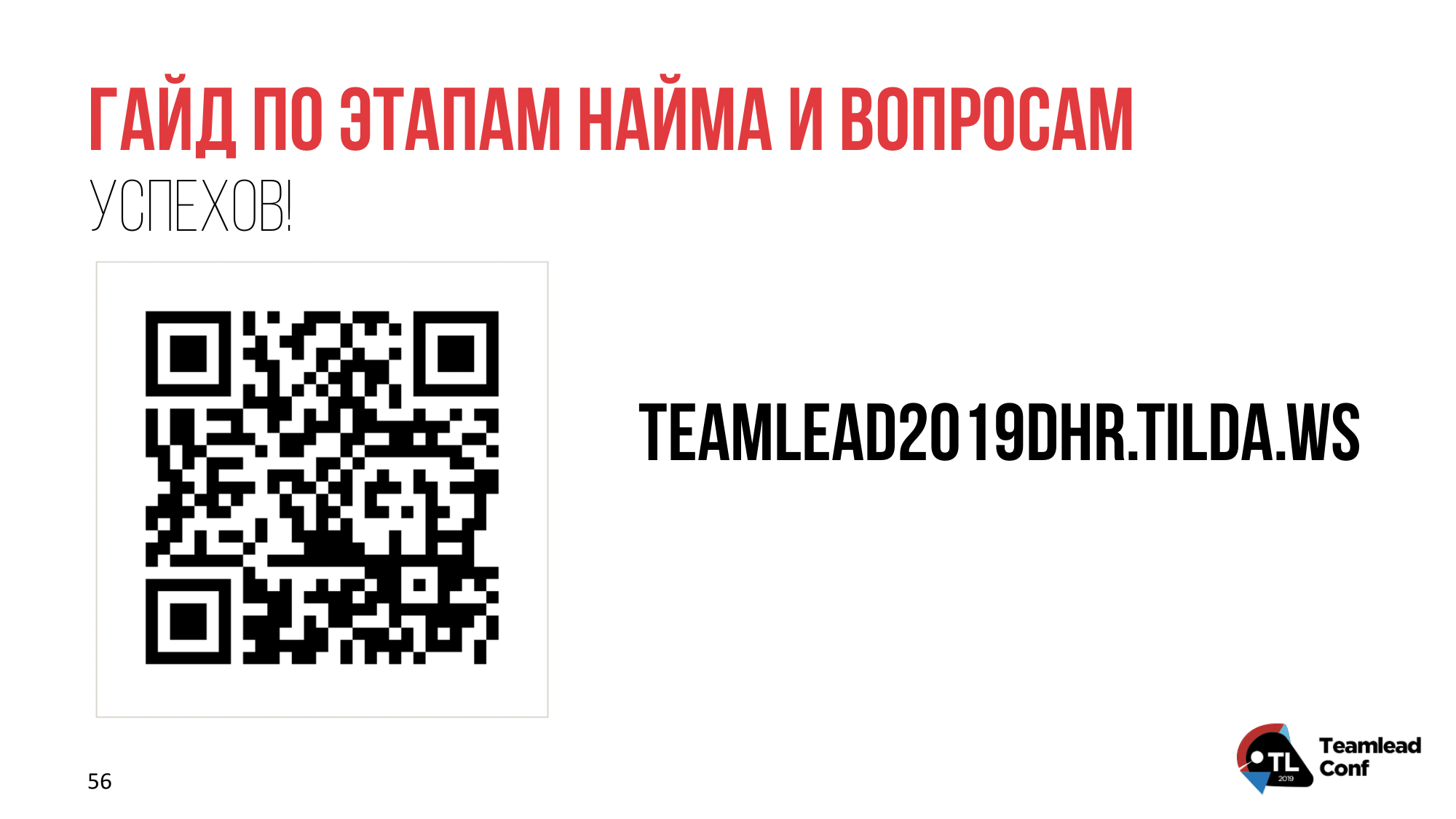
I prepared a landing page with tips , books, and a link to my favorite Excel, which makes hiring steps more transparent. Good luck!